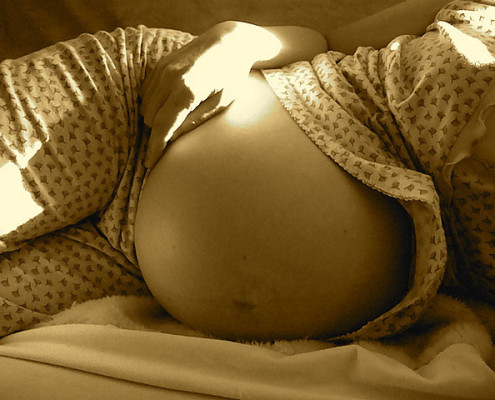Sleeping While Pregnant: 40 Winks in 40 Weeks
Last updated Aug. 29, 2017.
You probably already expect to be sleep-deprived once your little one arrives, but did you know that it starts well before the big day? Pregnancy affects your body in many ways, including how you sleep. In this post, we’ll talk about how pregnancy affects your sleep, how safe sleep aids are during pregnancy, plus the best type of mattress and position in which to sleep. We know sleeping while pregnant can be frustrating, if not feel impossible sometimes, so we’ll also answer some of the following most common questions:
Is it bad to sleep on my back while pregnant?
Can you sleep on your stomach when pregnant?
Can a pregnant woman sleep on an air mattress?
Read on for more.
Contents
How Pregnancy Affects Sleep
Pregnancy affects your sleep in a number of ways. Your body will start to produce a range of pregnancy-related hormones that can affect your ability to get a good night’s rest. These hormones affect your breathing and heart rate and may make you feel like you’re always short of breath. That makes it harder to relax into sleep.
One of these hormones is called relaxin. It loosens your ligaments and muscles to prepare you for the stretching of childbirth, but it also makes you more prone to strains and injuries. The pain of these small strains can also affect your rest.
In addition to these hormonal changes, there are the physical changes. These typically won’t affect you until your pregnancy is far enough along that you’re showing. The baby is growing, which will push on your diaphragm and make it harder to breathe easily while you sleep. Your expanding uterus will also push on your bladder, meaning you may have to get up several times a night to relieve yourself. You’ll have an increased volume of blood to supply both you and the baby, which will also make you need to use the restroom more often.
The weight of a baby can put a strain on your back, legs, and feet, so those aches and pains may make it harder for you to get comfortable at night.
See also: Should I Exercise While Pregnant?
Sleeping on Your Tummy — or Back — isn’t Safe
Finally, there’s the belly. You can’t sleep on your stomach once you start to show — it’s uncomfortable and it puts dangerous pressure on the baby. You also won’t be able to sleep on your back. Sleeping on your back may be uncomfortable for you as the weight of the baby presses against your organs and spine, but it is also dangerous for the baby.
The weight of the uterus will compress the muscles and organs around it, cutting down the blood supply to the developing fetus and to the rest of your body. That leaves sleeping on your side as the only safe and relatively comfortable option. Of course, it isn’t terribly comfortable to sleep with a pregnant belly even on your side.
Use a supportive pillow and sleep on your side to keep your developing little one safe and healthy during #pregnancy
Tweet
See also: Surprising Body Changes During Pregnancy
What sleep aids are safe during pregnancy?
Sleep is extremely important for both your health and the health of your baby — in fact, sleep problems during pregnancy recently have been tied to an increased risk of premature birth. Premature babies can have any number of potential health problems, including trouble breathing, anemia, and even brain damage.
So how can you get a good night’s rest while you’re pregnant? Check out these popular options below.
Pillow Use During Pregnancy
It’s tough to get comfortable with your belly growing, so pillows are your new best friend. You can place one between your knees to straighten out your spine and make sleeping on your side more comfortable. You can also put one against your back to help stop you from rolling onto your back in your sleep. An extra pillow for your head or stuffed under the head of the mattress may also ease heartburn.
If your regular pillows aren’t doing the trick, there are a variety of pillows specifically designed for pregnancy. They come in all shapes and sizes to help support your legs, hips, belly, and back. Most are designed to sit between your knees and wrap around in front and behind you so you’re completely supported on all sides. These pillows typically cost less than $100, so they may be cheaper than buying enough regular pillows to make yourself comfortable.
Consider a Pregnancy Air Mattress
If your budget allows, you may consider a specialty mattress to help you get a good night’s rest. For example, there are mattresses that allow you to adjust the placement of the springs to give you support where you need it. In addition, a bed with adjustable firmness (like a Sleep Number) can adjust to your changing needs over the course of your pregnancy. You can even buy an air mattress with a hole for your belly to allow you to sleep on your stomach.
However, the safety of these mattresses hasn’t been evaluated; the plastic can give off dangerous chemicals and sleeping on your stomach may pull and stretch your skin and ligaments. You should consult your doctor before purchasing one.
Avoiding Heartburn-Causing Foods
Heartburn is a common pregnancy complaint. Fortunately, you may be able to get some relief (and some sleep!) by making a few changes to your diet. First, don’t eat large meals late at night. Give your body at least a couple of hours to digest your dinner before you head for bed. However, an empty stomach may make you feel nauseated in the middle of the night.
You may want to eat a light snack with lots of protein before bed to keep you full while you sleep. You may also want to keep a bland snack nearby to calm a queasy stomach. The best option is a glass of warm milk before bed — it has protein to keep you full, it can ease your heartburn, and can lull you into sleepiness. Remember to drink pasteurized milk to avoid infections that might hurt the baby.
Sleep Medications for Pregnancy
When you’re not pregnant, a simple pill may be all it takes to put you out for the night. Unfortunately, you don’t have that option while pregnant. Medicinal sleep aids are generally not approved for use in pregnant women. That applies to herbal supplements, not just prescription and over-the-counter medications. Melatonin, tryptophan supplements, and other herbal remedies are not regulated by the FDA and may be harmful to the baby.
If you do suffer from insomnia or another serious sleep condition, talk to your doctor about what treatment options are available. You and your doctor may decide to change or stop medication you’ve been taking for sleep troubles. You should never stop taking a prescription without consulting your doctor.
Naps for Pregnant Women
Nothing beats getting a full 40 winks, but many people find themselves napping during pregnancy. That’s just fine — it’s a way for your body to get a little extra rest. As when going to bed for the night, remember to sleep on your side to avoid putting pressure on the baby.
Bottom Line: Sleep Well, and Often!
Sleep is so important to how we feel and function and few things are more frustrating than not getting enough of it. These tips can help you rest a little easier as you get ready to welcome your new little one into the world.
If you have any tips of your own for sleeping while pregnant, please share them in the comments!
Image Credit and License









I found staying active doing activities like gentle yoga and walking during the day (but not too much!!) to really help me better sleep at night.
Also, being part of a birth group forum also helped reduce some of my anxieties of becoming a mother. It also was a source of information/entertainment during some of my sleepless hours.